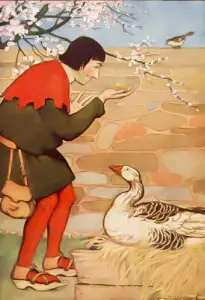The Man and His Goose (from the Fables of Aesop)

Սիրտ ագահին ոչ գիտէ յագ,
Թէ եւ իցէ յոսկի համակ։
Մէկ սագ մը ամէն օր մէյմէկ ոսկիէ
Ագահութիւնը երբոր ագահին սրտին մէջ թագաւորէ կը կուրացնէ զայն. եւ որչափ շատնայ ոսկին՝ այնչափ այս մոլութիւնն ալ կը սաստկանայ. վերջապէս հոգին ալ կ’այրէ մարմինն ալ։ Դիոգինէս փիլիսոփային հարցուցին, թէ ոսկին ինչո՞ւ դեղին է։ Պատասխանեց թէ Շատ փնտռող ունենալուն համար վախուն դեղներ է։
A certain Man had a Goose, which laid him a golden egg every day. But, not contented with this, which rather increased than abated his avarice, he was resolved to kill the Goose, and cut up her belly, that so he might come at the inexhaustible treasure which he fancied she had within her. He did so; and, to his great sorrow and disappointment, found nothing.
They who are of such craving impatient tempers, that they cannot live contented when fortune has blessed them with a constant and continued sufficiency, deserve even to be deprived of what they have. And this has been the case of many ambitious and covetous men, who, by making an essay to grow very rich at once, have missed what they aimed at, and lost what they had before. If any thing further can be couched in this, it may possibly be intended to show us the unreasonableness and inconvenience of being solicitous about what may happen hereafter, and wanting to pry into the womb of futurity: which if we could do, all we should get for our pains would be, to spoil our pleasures by anticipation, and double our misfortunes by a previous sense and apprehension of them. There are some things that entertain and delight us very agreeably while we view them at a proper distance; which, perhaps, would not stand the test of a too near inspection. Beauty, being only the external form of a thing which strikes the eye in a pleasing manner, is a very thin glossy being, and, like some nice paintings of a peculiar composition, will not well bear even to be breathed on: to preserve our good opinion of it, we must not approach too close; for if, like the man in the fable, we have a mind to search for a treasure within, we may not only fail of our expectations there, but even lose the constant relish we enjoyed from a remoter contemplation.


Comments
Post a Comment